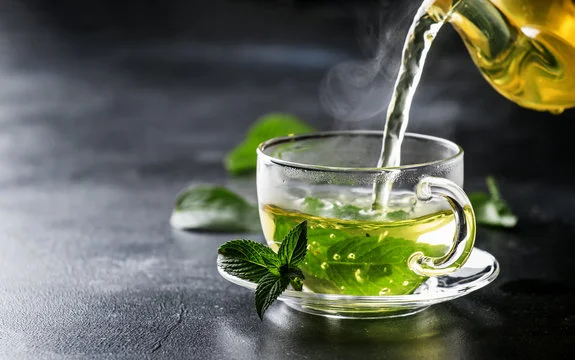Green tea is much more than just a soothing beverage , it’s a powerhouse of health benefits. In this article” Discover the incredible benefits of green tea, from boosting brain function to aiding weight loss. Learn how to brew the perfect cup and why this ancient drink is still a modern wellness essential.”
What Is Green Tea?
Green tea is derived from the Camellia sinensis plant, it is the same source from which black and oolong teas come. What sets green tea different is its minimal processing. Shortly after harvesting, the leaves are steamed or pan fired to prevent oxidation. This careful handling preserves its delicate flavor, vibrant green color, and, most importantly, its incredible nutrient profile.

History and Origins of Green Tea
Green tea was first cultivated in China during the Shang Dynasty. Legend says Emperor Shen Nong discovered it when tea leaves accidentally fell into his boiling water. Later, Buddhist monks introduced green tea to Japan, where it became integral to Japanese tea ceremonies. Today, China and Japan remain the top producers, but green tea is enjoyed globally.
Types of Green Tea
There are many varieties of green tea, each having unique flavors and processing methods:
- Sencha (Japan)
The most common Japanese green tea.
Steamed to preserve freshness, with a grassy, slightly sweet taste. - Matcha (Japan)
Stone-ground powdered green tea used in ceremonies.
Rich in antioxidants and provides sustained energy. - Dragon Well (Longjing, China)
Pan-fired for a nutty, smooth flavor.
Considered one of China’s finest teas. - Gunpowder (China)
Rolled into small pellets that unfurl when steeped.
Strong, slightly smoky taste. - Gyokuro (Japan)
Shade-grown for a sweeter, umami-rich flavor.
High in chlorophyll and L-theanine. - Bancha (Japan)
Made from mature leaves, offering a milder taste.
Often consumed daily in Japanese households.
Health Benefits of Green Tea
Green tea is packed with polyphenols, catechins (especially EGCG), and L-theanine, contributing to its health benefits:
Boosts Metabolism & Aids Weight Loss
Numerous studies suggest that green tea can increase fat burning and boost metabolic rate. The combination of caffeine and catechins makes it a popular natural supplement for those aiming to shed pounds.
Rich in Antioxidants
Green tea is loaded with catechins, a type of natural antioxidant that helps prevent cell damage. The most powerful catechin, EGCG (Epigallocatechin Gallate), has been linked to a range of health benefits, from improved heart health to cancer prevention.

Supports Heart Health
Regular green tea consumption is associated with lower cholesterol levels, reduced blood pressure,improves blood flow and a decreased risk of heart disease and stroke. It helps protect LDL particles from oxidation, one of the pathways towards heart disease.
Enhances Brain Function
Thanks to its moderate caffeine content and amino acid L-theanine, green tea can improve brain function such as focus, memory, and cognitive performance. It enhances alertness without the jitteriness often associated with coffee, promoting a calm and focused state of mind.
Regulates Blood Sugar
Green tea may improve insulin sensitivity,so beneficial for those with type 2 diabetes.
Promotes Healthy Skin
The anti-inflammatory and antioxidant properties of green tea extend to your skin, helping reduce signs of aging, combating acne, and protecting against UV damage.
How to Brew the Perfect Cup of Green Tea
Brewing green tea is an art. To enjoy its full flavor and health benefits, follow these simple steps:
Choose Quality Tea: Opt for loose-leaf tea over bagged tea for a richer taste and higher nutrient content.
Ingredients
1 tsp (2–3 grams) loose-leaf green tea
8 oz (240 ml) water
Optional: lemon, honey, or mint
Steps
Water Temperature: Heat water to 160–180°F (70–80°C)—never boiling, as it can make green tea bitter.
Preheat Teapot/Cup: Rinse with warm water to maintain temperature.
Steep Time: Steep the tea for 2–3 minutes. Over-steeping can release too many tannins, making the tea overly astringent.
Enjoy Mindfully: Savor your tea slowly, appreciating its aroma, taste, and the calming ritual it offers.
Pro Tips
Use filtered water for better taste.
Avoid over steeping to prevent bitterness.
Tea should be Stored in an airtight container, and keep it away from light and moisture.
Potential Side Effects & Precautions
While green tea is safe for most people, excessive consumption may cause:
Caffeine sensitivity: Jitters, insomnia (limit to 3–4 cups/day).
Iron absorption interference: Drink between meals if iron-deficient.
Stomach irritation: Avoid on an empty stomach if sensitive.
Pregnant women and those on medications should consult a doctor before high intake.
Conclusion: Why Green Tea is a Superfood
Green tea is more than just a soothing drink—it’s a powerhouse of antioxidants, metabolism boosters, and brain-enhancing compounds. Whether you prefer the grassy notes of Sencha or the creamy richness of Matcha , incorporating green tea into your routine can offer long-term health benefits.
So next time you reach for a drink, consider swapping your soda or second cup of coffee for a soothing, vibrant cup of green tea.
Ready to experience the magic of green tea? Try different varieties and brewing methods to find your perfect cup!